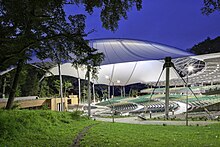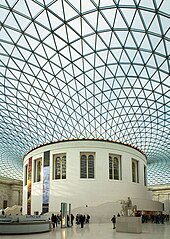Shell (structure)



A shell is a three-dimensional solid structural element whose thickness is very small compared to its other dimensions. It is characterized in structural terms by mid-plane stress which is both coplanar and normal to the surface. A shell can be derived from a plate in two steps: by initially forming the middle surface as a singly or doubly curved surface,[1] then by applying loads which are coplanar to the plate's plane thus generating significant stresses. Materials range from concrete (a concrete shell) to fabric (as in fabric structures).
Thin-shell structures (also called plate and shell structures) are lightweight constructions using shell elements. These elements, typically curved, are assembled to make large structures. Typical applications include aircraft fuselages, boat hulls, and the roofs of large buildings.
Definition
A thin shell is defined as a shell with a thickness which is small compared to its other dimensions and in which deformations are not large compared to thickness. A primary difference between a shell structure and a plate structure is that, in the unstressed state, the shell structure has curvature as opposed to the plates structure which is flat. Membrane action in a shell is primarily caused by in-plane forces (plane stress), but there may be secondary forces resulting from flexural deformations. Where a flat plate acts similar to a beam with bending and shear stresses, shells are analogous to a cable which resists loads through tensile stresses. The ideal thin shell must be capable of developing both tension and compression.[2]
Types
The most popular types of thin-shell structures are:
- Concrete shell structures, often cast as a monolithic dome or stressed ribbon bridge or saddle roof
- Lattice shell structures, also called gridshell structures, often in the form of a geodesic dome or a hyperboloid structure
- Membrane structures, which include fabric structures and other tensile structures, cable domes, and pneumatic structures.
See also
Persons related:
References
Further reading
- Bechthold, Martin (2008-03-20). Innovative Surface Structures: Technologies and Applications (1 ed.). Abingdon: Taylor & Francis. ISBN 9780415419673.
- Suchov, Vladimir G. (1990). Rainer Gaefe (ed.). VLADIMIR G. SUCHOV 1853-1939; Die Kunst Der Sparsamen Konstruktion (1st ed.). Stuttgart: Deutsche Verlags-Anstalt. ISBN 9783421029843.
External links
- Thin-shell structures
- Double thin-shells structures
- Hypar & Concrete Shells
- Past and Future of Grid Shell Structures
- Shape optimization of Shell and Spatial structure
- Lattice Shell for Space Vehicles
- International Association for Shell and Spatial Structures
